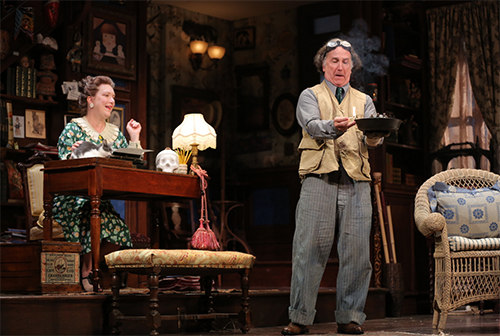By MARK BLANKENSHIP
You Can't Take It With You is a wonderfully slippery play. You think you've got it nailed as a loopy comedy, and then it delivers a tender love scene. You're convinced it's breezy good time, and then it dismantles the fantasy of American success
This complexity---this ability to be funny and lovable and sly and political---give the show tremendous vitality. That's arguably why it's been produced over and over for almost 80 years.
Written in 1936 by Moss Hart and George S. Kaufman, the play follows the Sycamores, a family of eccentrics who see no problem with having ballet lessons in the living room or taking up playwriting after a typewriter gets accidentally delivered to the house.
But as charming as they are, the Sycamores aren't quite like "us." The "average American" is ostensibly like Mr. Kirby, a successful businessman who gave up foolish pursuits to earn a proper living. So when his son falls for young Alice Sycamore, worlds collide in all sorts of ways.
Which family will prevail---the one that lives to make money or the one that lives to be happy? That question throbs behind all the jokes.
It's been thirty years, however, since Broadway audiences got to grapple with the play's ideas. So the current revival, now at the Longacre, may remind people just how much it has to say.
Mark Linn-Baker is certainly seeing the show with fresh eyes. He stars as Paul Sycamore, Alice's father and an enthusiastic inventor of fireworks (that frequently explode in the basement.) "I had read the play, but I had not seen it," he says. "One of the things that surfaces from working on it with such an amazing group of people is how well-written it is."
For one thing, he notes, even the silliest characters have moments of depth. For instance, after a disastrous dinner party with the Kirbys, Mr. Sycamore worries that he's let his daughter down by choosing fireworks over a more respectable profession.
"When I read the play again, that was the moment I focused on in terms of the character," Linn-Baker says. "That's the moment where he gives voice to doubt. It's not caricature. It's not black and white."
In that doubt, the actor also sees the play's connection to modern times. He explains, "This play was written in 1936. It was seven years after the crash. We are currently six or seven years after our last crash---the largest economic crisis since the Depression. And in many ways, the culture of the country is in the same dilemma.
"If we're at a point where most people aren't going to make it financially---where it's the one percent that is doing well and everybody else is going to struggle---that's important. That's important in a culture that values financial success overall. And these people [the Sycamores] have chosen something else. And in that moment, [Paul] has doubt. He says, 'Oh my god. Maybe we made the wrong choice.'"
As Linn-Baker says, Mr. Sycamore's anxiety pushes You Can't Take It With You past the simplified rhetoric of a culture war, where the bohemians are always playing music and the capitalists are always closing deals. "There's a tendency to polarize, and this play goes beyond the polarization."
---
Mark Blankenship is TDF's online content editor
Photos by Joan Marcus
